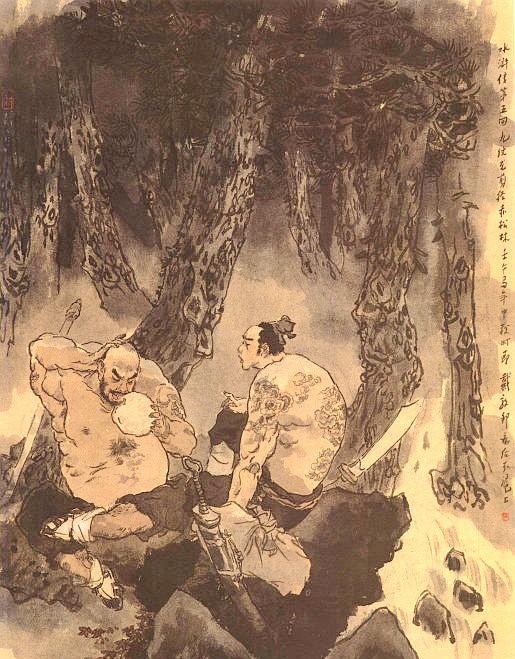"Water Margin" writes a lot of ancient green forest terms, that is, "black words", also called "incisions", is a kind of jianghu "hidden language".
For example, the book mentions "xiang foot head", "stepping on the plate", "stopping the horse", "hair market", "cow", "slipping bone marrow", "cutting path", "pounding", "bumping chips" and so on.
"Scissors" is one of the more famous words, appearing ten times in Water Margin.
It first appeared in the fifth time, "Little Bully Drunk into the Golden Tent flower monk big trouble peach blossom village", the book specifically gave an explanation:
It turned out that the strong man bowed down, did not say this two words, for the disadvantage of the army, only called "scissors", which is the auspicious word.
"Worship" and "defeat" are homophonous, which is naturally taboo for the good men of the green forest.
So, where is Geely embodied?
"Scissors" has two harmonic sounds, one says "pick up blessings" and the other says "see Buddha", which actually means the same thing.
When you pray, you need to bend down and meet new people, which is equivalent to "picking up a blessing", which is very flattering.
Walking the rivers and lakes, going out to rely on friends, multiple friends and many roads, so seeing friends is like "seeing Buddha".

Zhi Shen said his name Bi, and the Han skimmed the Park Knife, turned over and cut it, and said, "Do you recognize Shi Jin?" "The two cut again, and sat down together in the woods."
The word was inherited by future generations. For example, in the twenty-second episode of the "Saying Tang Dynasty", more black words are mentioned.
You Junda said to Cheng Yaojin:
Junda smiled, "It turns out that my brother didn't know about the dumb riddle in this Dao." When the robbers saw the ceremony, it was called 'cutting the Buddha'. When I saw some merchants, it was called 'wind coming', it was called 'small wind' when it came, and it was called 'strong wind' when it came. If it is not enough to kill, it is called 'wind tight', so as to respond. 'Collecting accounts' is to guard the cottage and ask how much it has been robbed. This line of mountain mystery, brothers must know. ”
At the time of the Ming and Qing dynasties, there was a book "Jianghu Cut Essentials", which also mentioned that "Qifu" was the meaning of "worship" for jianghu people.
Zhai Hao of the Qing Dynasty, in volume 38 of the Popular Compilation, "Zhiyu City Language", quoted some of the contents of this book:
Jianghu people especially speak a lot of language. There is a moment of "Jianghu Cut", everything and everything, there are hidden names, sincerely so-called confusion and hearing, there is no enough to collect.
In the meantime, there are people who pass through the city wells, such as the official Gusi, the shop is known as Chaoyang, the husband is known as Gai Lao, and the wife is known as the bottom old ,...... Sitting is called "hitting the pier", worshiping is called "throwing the whisk", "throwing the circle", and kowtowing is called "losing the plaque".
Popular Edition, volume 38, written by Zhai Hao in the Qing Dynasty, p820
Special Additional Notes:
The matter of "giving gifts" has a variety of names in the "Water Margin".
Among the officials of the same rank, it is called "performing ceremonies";
Ordinary people see officials or subordinates see superiors, and often use "singing";
Ordinary people meet at ordinary generations, for "making a move", if you want to show respect, you use "worship";
The monks perform rituals called "auditors" or "interrogators";
The woman's salute is called "Ten Thousand Blessings";
Only the salute between the good men of the green forest is called "cutting".
However, this kind of etiquette was limited to the good men of the same generation, such as Lu Zhishen and Li Zhong, Zhou Tong, Shi Jin, Yang Zhi; Dai Zong and Deng Fei, Meng Kang; Li Kui and Li Yun; Shaohuashan and Lu Zhishen, Wu Song...
In the case of Song Jiang, the boss of Liangshan, it does not apply.
There is no description of Song Jiang and the good men "cutting and blowing" in the whole book.
When you see Boss Song, the most common action is "na head worship" or "jump over and worship", while Big Brother Song is usually "hold up", "lift up" or "answer".
In addition, the word "翦拂" has multiple meanings.
In 1928, Mr. Lin Yutang published his first collection of essays, called "Zhai Fu Collection", which was named "Reminiscing about the Past, Commemorating Old Friends, Cutting Paper to Summon Spirits".
Although it is still related to friends, it is far from the underworld.
#Shui Po Liang Shan ##Water Margin ##Four Masterpieces ##Chinese ##古典文学 #